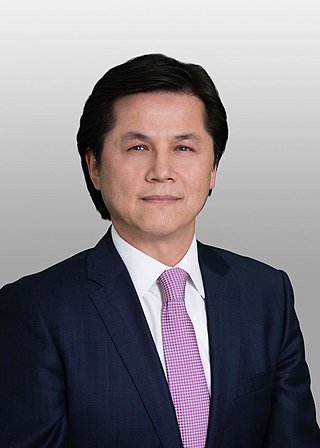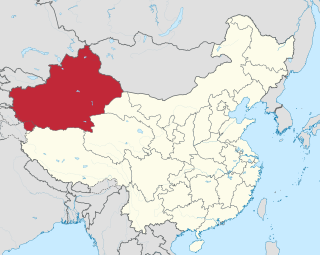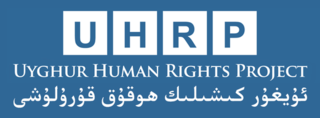
The Uyghur American Association is a prominent Uyghur American non-profit advocacy organization based in Washington, D. C. in the United States. It was established in 1998 by a group of Uyghur overseas activists to raise the public awareness of the Uyghur people, who primarily reside in Xinjiang, China, also known as East Turkestan. The Uyghur American Association is an affiliate organization of the World Uyghur Congress and works to promote the Uyghur culture and improved human rights conditions for Uyghurs.

Nury Ablikim Turkel is an American attorney, public official and human rights advocate based in Washington, D.C. He is currently Chair of the United States Commission on International Religious Freedom (USCIRF).

The Magnitsky Act, formally known as the Russia and Moldova Jackson–Vanik Repeal and Sergei Magnitsky Rule of Law Accountability Act of 2012, is a bipartisan bill passed by the U.S. Congress and signed into law by President Barack Obama in December 2012, intending to punish Russian officials responsible for the death of Russian tax lawyer Sergei Magnitsky in a Moscow prison in 2009 and also to grant permanent normal trade relations status to Russia.

The Xinjiang conflict, also known as the East Turkistan conflict, Uyghur–Chinese conflict or Sino-East Turkistan conflict, is an ongoing ethnic geopolitical conflict in what is now China's far-northwest autonomous region of Xinjiang, also known as East Turkistan. It is centred around the Uyghurs, a Turkic ethnic group who constitute a plurality of the region's population.

The Hong Kong Human Rights and Democracy Act of 2019 (HKHRDA) is a United States federal law that requires the U.S. government to impose sanctions against mainland China and Hong Kong officials considered responsible for human rights abuses in Hong Kong, and requires the United States Department of State and other agencies to conduct an annual review to determine whether changes in Hong Kong's political status justify changing the unique, favorable trade relations between the U.S. and Hong Kong. The passage of the bill was supported by pro-democracy activists in Hong Kong, and in 2019 received near-unanimous support in Congress.
The East Turkistan National Movement also known as the East Turkistan National Awakening Movement is a non-profit human rights and political advocacy organization established in June 2017 in Washington D.C. Salih Hudayar, a Uyghur American consultant and graduate student founded the group after pre-existing Uyghur organizations failed to openly call for East Turkestan independence deeming it "controversial".

The Xinjiang internment camps, officially called vocational education and training centers by the government of China, are internment camps operated by the government of Xinjiang and the Chinese Communist Party Provincial Standing Committee. Human Rights Watch says that they have been used to indoctrinate Uyghurs and other Muslims since 2017 as part of a "people's war on terror", a policy announced in 2014. The camps have been criticized by the governments of many countries and human rights organizations for alleged human rights abuses, including mistreatment, rape, and torture, with some of them alleging genocide. Some 40 countries around the world have called on China to respect the human rights of the Uyghur community, including countries such as Canada, Germany, Turkey and Japan. The governments of more than 35 countries have expressed support for China's government. Xinjiang internment camps have been described as "the most extreme example of China's inhumane policies against Uighurs".
In May 2014, the Government of the People's Republic of China (PRC) launched the "Strike Hard Campaign against Violent Terrorism" in the far west province of Xinjiang. It is an aspect of the Xinjiang conflict, the ongoing struggle by the Chinese Communist Party (CCP) and the Chinese government to manage the ethnically diverse and tumultuous province. According to critics, the CCP and the Chinese government have used the global "war on terrorism" of the 2000s to frame separatist and ethnic unrest as acts of Islamist terrorism to legitimize its counter-insurgency policies in Xinjiang. Chinese officials have maintained that the campaign is essential for national security purposes.

The Xinjiang papers are a collection of more than 400 pages of internal Chinese government documents describing the government policy regarding Uyghur Muslims in the Xinjiang region. In November 2019, journalists Austin Ramzy and Chris Buckley at The New York Times broke the story that characterized the documents as "one of the most significant leaks of government papers from inside China's ruling Communist Party in decades." According to The New York Times, the documents were leaked by a source inside the Chinese Communist Party and include a breakdown of how China created and organized the Xinjiang internment camps.

The Chinese government is committing a series of ongoing human rights abuses against Uyghurs and other ethnic and religious minorities in Xinjiang that is often characterized as persecution or as genocide. Beginning in 2014, the Chinese government, under the administration of Chinese Communist Party (CCP) General Secretary Xi Jinping, incarcerated more than an estimated one million Turkic Muslims without any legal process in internment camps. Operations from 2016 to 2021 were led by Xinjiang CCP Secretary Chen Quanguo. It is the largest-scale detention of ethnic and religious minorities since World War II. The Chinese government began to wind down the camps in 2019. Amnesty International states that detainees have been increasingly transferred to the formal penal system.

The China Cables are a collection of secret Chinese government documents from 2017 which were leaked by exiled Uyghurs to the International Consortium of Investigative Journalists, and published on 24 November 2019. The documents include a telegram which details the first known operations manual for running the Xinjiang internment camps, and bulletins which illustrate how China's centralized data collection system and mass surveillance tool, known as the Integrated Joint Operations Platform, uses artificial intelligence to identify people for interrogation and potential detention.

Rushan Abbas is a Uyghur American activist and advocate from the Xinjiang Uyghur Autonomous Region in China. She is the founder and executive director of the nonprofit Campaign for Uyghurs. Abbas became one of the most prominent Uyghur voices in international activism following her sister's detainment by the Chinese government in 2018.

The Uyghur Forced Labor Prevention Act is a United States federal law that changed U.S. policy on China's Xinjiang Uyghur Autonomous Region with the goal of ensuring that American entities are not funding forced labor among ethnic minorities in the region.

Salih Hudayar is a Uyghur-American politician known for advocating for East Turkistan independence. He founded the East Turkistan National Awakening Movement and has since been leading the movement calling for the "restoration of East Turkistan's independence."

The East Turkistan Government in Exile, officially the Government in Exile of the Republic of East Turkistan, is a political organization established and headquartered in Washington, D.C. by Uyghurs, Kazakhs, and other peoples from East Turkistan (Xinjiang). The ETGE claims to be the sole legitimate organization and a parliamentary-based government in exile representing East Turkistan and its people on the international stage.

The Uyghur Human Rights Project is a research-based advocacy organization located in Washington, D.C. that promotes human rights for Uyghurs. According to the UHRP, its main goal is "promoting human rights and democracy for Uyghurs and others living in East Turkistan" through research-based advocacy.

Xinjiang is the leading producer of cotton in China, accounting for about 20% of the world's cotton production and 80% of China's domestic cotton production. Critics of the industry's practices have alleged widespread human rights abuses, prompting global boycotts. China rejects accusations that any human rights abuses occur either within the Xinjiang cotton industry or within China overall.

The Uyghur Tribunal was an independent "people's tribunal" based in the United Kingdom aiming to examine evidence regarding the ongoing human rights abuses against the Uyghur people by the Government of China and to evaluate whether the abuses constitute genocide under the Genocide Convention. The tribunal was chaired by Geoffrey Nice, the lead prosecutor in the trial of Slobodan Milošević, who announced the creation of the tribunal in September 2020.

Rayhan Asat is a Uyghur lawyer and human rights advocate. Since 2020, she has led a public campaign for the release of her brother, Ekpar Asat, who has been held in the Xinjiang internment camp system since 2016, and on behalf of the Uyghurs and other ethnic minorities in China. In 2021, she joined the Strategic Litigation Project at the Atlantic Council as a Nonresident Senior Fellow and became a Yale World Fellow. Asat is also a Senior Fellow at the Raoul Wallenberg Centre for Human Rights and President of the American Turkic International Lawyers Association.
The OHCHR Assessment of human rights concerns in the Xinjiang Uyghur Autonomous Region, People's Republic of China is a report published on 31 August 2022 by the Office of the United Nations High Commissioner for Human Rights (OHCHR) concerning the treatment of Uyghurs and other largely Muslim groups in China. The report concluded that "[t]he extent of arbitrary and discriminatory detention of members of Uyghur and other predominantly Muslim groups, pursuant to law and policy, in context of restrictions and deprivation more generally of fundamental rights enjoyed individually and collectively, may constitute international crimes, in particular crimes against humanity." Human rights commissioner Michelle Bachelet released the report shortly before leaving the office.















